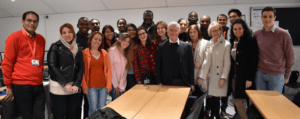
Organizers Armelle Phalipon and Béhazine Combadiere, Speakers Rino Rappuoli and Marie-Paule Kieny, and participants during the 12th Vaccinology Course.
Since 2008 the Institut Pasteur in Paris, France has facilitated the Vaccinology Course, a course that covers all aspects of vaccines and vaccination, and allows participants from all over the world to attend lectures by immunologist whom conduct cutting-edge research. I have had the amazing opportunity to participate in the most recent edition (12th) of this amazing course. In addition to attending to the course I also interviewed the organisors Armelle Phalipon (AP) and Béhazine Combadiere (BC) about the course (read future articles for more details about their research)
When and why did you start to organize this course? AP: In 2007, Frédéric Tangy, an expert in virology and measles vaccinology and I were tasked with assessing and improving the visibility of Institut Pasteur in the field of vaccines. “As you know, the history of Pasteur is based on vaccines. So we were given total freedom to organising a course, without budget limitations [at that time]. This gave us the opportunity to build something quite ambitious. It enabled us invite he most renown scientists in the vaccinology field.This course was initially 5 weeks, because the objective is to teach the participants processors associated with developing a vaccine. We rapidly realised that 5 weeks was more than enough, so, we shorten it a bit, now it’s a 4-week course. Maybe it´s still long, this is the only way we managed to cover all aspects of vaccinology.
Who should take this course? How can I apply for it? BC: The course of Vaccinology, covers everything from the design of a vaccine to its implementation and marketing. So, everybody who wants to know more about vaccine development or just enter te , they should participate in this course. The objective is to share all the knowledge between experimented people in vaccination, as well as inexperienced people that would like to be involved in vaccinology. It is a world-wide open course. Applications are now open!
My experience as a participant: The fact that the course covers all stages of vaccinology, has given me, a post-graduate student who conducts research pre-clinical stages of vaccines, the ability to “see the big picture” in the complex and long road to a new vaccine needs. It is brilliantly organized by Armelle Phalipon and Béhazine Combadiere and their team at Institut Pasteur. They are leading scientists in their fields, and also make sure that everything run perfectly during the course, and work very hard to supply scholarships for students from all over the world. Lecturers are cutting-edge immunologists from all over the world, that have been involved in the revolution of the vaccine-world (and even participated in the design of vaccines we use nowadays, and wrote the books from which we all learn globally). Last but not least, the participants are from all over the world, and from different backgrounds, so, the exchange of experiences is remarkable. Definitely, it is an outstanding experience for researchers in the vaccinology field. As a former participant, I am deeply grateful to the organizers for the marvelous opportunity of allowing me to be there and for making it perfect, to all the speakers for their kindness in sharing their outstanding knowledge and experiences, and to the participants of the 12th edition, for sharing their experiences and having such a great time. To everybody in vaccine research who have not applied yet: I encourage you all to do it!
You can read more about the course in Hum Vaccin Immunother. 2018; 14(9): 2105–2106. doi: 10.1080/21645515.2018.1490379.
Article by Mariana Rivera











